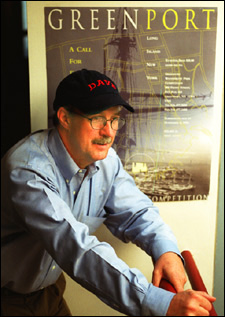Greenport Mayor Kapell learns on the job:
Sitting mayor earns Kennedy School MPA, with help of email, understanding

David Kapell may be a long way from home, but he still runs the place.
Kapell – make that Mayor Kapell – is completing a one-year Mid-Career Master’s in Public Administration Program at the John F. Kennedy School of Government. For the past year, Kapell has been both graduate student and mayor of Greenport, N.Y., a post he’s held since 1994.
Kapell acknowledges the past year has been a challenging exercise in ordering priorities. Not only has he attended to his studies and to his mayoral workload, he also ran for re-election in March, winning by a 4 to 1 margin.
“There was never any open controversy over me coming up here,” Kapell said of the campaign. He acknowledged that it is unusual for a town to send its mayor away for any length of time, but said his Kennedy School studies received the blessing of Greenport’s Board of Trustees ahead of time. He also cites the election results as a testament to the village’s support for his actions.
“They re-elected me,” he said simply.
Kapell is one of several sitting elected officials who attend the Kennedy School each year, Kennedy School officials said. He is joined this year by several members of the Massachusetts state legislature, a member of the Illinois state legislature, and a member of the Boston City Council.
For Kapell, cell phone and e-mail were essential tools and became his constant companions. The ferry connection from New London, Conn. to Orient Point, N.Y., also became a critical resource. The ferry cut travel time to Greenport, on Long Island’s north shore, to less than three hours, saving at least two hours on the trip through New York City’s traffic and along the length of Long Island.
The Greenport board’s endorsement of his studies has also been critical. It’s allowed Kapell to miss meetings he ordinarily would have attended. He has returned at least every other weekend, devoting those days to one-on-one meetings and touching base with Greenport officials.
Still, he said, work has piled up. Things that could be postponed until after graduation have been, he said, leading to a large backlog awaiting his return.
“I have to go back to the village and get back to work,” Kapell said.
Kapell looks forward to returning to Greenport and putting the year’s experience to work. Political opponents who hope for a changed mayor may be disappointed, however.
The year’s experience has deepened his commitment to maintaining a diverse community with solidly working-class roots, Kapell said. That means resisting the forces of gentrification, he said, which are increasingly pushing property values out of reach of children who grew up in Greenport.
“The most important thing I go back with is a confirmation of the importance of respect for diversity,” Kapell said. “The diversity I’ve been exposed to here is beyond anything I’ve ever seen. It’s easy to divide and conquer along these [racial or ethnic] fractures. I’ll go back with a reinforced commitment to try to find common ground across diverse cultures.”
In some ways, Greenport’s current problems are a result of its recent success. When Kapell first moved to Greenport from New York City in 1979, the 1-mile-square village was severely blighted, Kapell said.
Kapell, who left a business managing restaurants in New York City, moved to Greenport – an autonomous village within the town of Southold – to take over as director of community development. Kapell began bringing in state and federal grant money, including Section 8 rent subsidies, which helped the village’s low-income residents pay market rents in neighborhoods shared by those of other income groups, rather than living in dedicated housing projects.
Kapell said he believes the socioeconomic diversity within Greenport is one of the village’s strengths. Today, he said, Section 8 rental subsidies are used for one-quarter of Greenport’s housing, and he credits the program with providing housing stability in the village, anchoring the area against runaway housing prices.
Over the years, Kapell has promoted several controversial measures, such as abolishing the village police department to save money, offering to rent sites for cell phone towers and electric power plants on village-owned land to raise revenue, and pushing for the development of a skateboard park to draw youth – and their families – to town.
Greenport has rebounded in recent years from declining shipping and fishing industries that once provided its economic lifeblood. The village’s economic base today is more diverse and includes a regional hospital, the nearby Plum Island animal research facility, agriculture, tourism, and seasonal visitors.
“Greenport was and still is a traditional working-class seaport,” Kapell said. “That’s part of its appeal. It’s a real place.”




